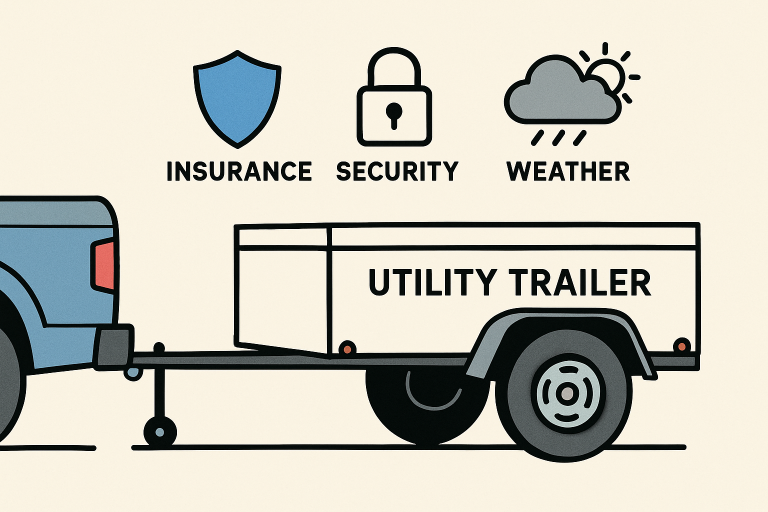Key Takeaways
- Utility trailer insurance requirements and options vary widely by state and usage scenario.
- While standard auto policies often extend some coverage, physical damage and content losses frequently remain uninsured unless you purchase additional protection.
- Specialized insurance for utility trailers can provide coverage for theft, collision, weather damage, and cargo, which are not typically included in basic auto policies.
Utility trailers offer invaluable support for transporting heavy equipment, landscaping tools, furniture, recreational vehicles, and more. Whether you use one for work or personal projects, protecting your trailer isn’t just smart—it can be essential for peace of mind and financial security. But when considering do utility trailers need insurance, the answer often depends on your location, how the trailer is used, and the level of coverage your current policies provide.
Many trailer owners assume their trailer is automatically covered under their standard auto policy, but that is not always the case. Liability coverage may extend from your tow vehicle. Yet, such protection often neglects physical damage to the trailer itself, as well as losses from theft, vandalism, or unexpected events while the trailer is parked or stored. Being informed about your insurance options will help you ensure that your trailer and whatever you’re hauling are properly protected both on and off the road.
Failing to account for coverage gaps can result in costly out-of-pocket expenses if your trailer is damaged or stolen. With utility trailers being frequent targets for theft—especially when loaded with valuable goods or left unattended at job sites or campsites—understanding your insurance responsibilities is crucial for any trailer owner. Research before a mishap occurs prevents unwelcome financial surprises and eases the process of making a claim.
Additional considerations arise if your trailer is used commercially or if you transport specialized contents that may require added coverage. Reviewing your options with a knowledgeable insurance agent ensures your protection is both effective and compliant with local regulations.
State-Specific Insurance Requirements
Utility trailer insurance regulations vary by state and province. In some regions, such as Florida, there’s no legal obligation to maintain a separate insurance policy for a non-motorized trailer—the liability coverage from your towing vehicle’s auto insurance may suffice. That said, other states might mandate proof of trailer insurance before you can register or use the trailer on public roads. For example, in California and New York, the Department of Motor Vehicles may require you to show financial responsibility or minimum property coverage if your trailer exceeds a certain value or weight. Always confirm with local transportation authorities or your insurance provider, as requirements evolve and may impact your ability to tow lawfully.
It’s important to note that even when not strictly required by state law, lenders may still demand insurance coverage if your trailer is financed. Protecting the lender’s interest—and your own investment—becomes part of the purchase agreement.
Coverage Under Standard Auto Policies
Many drivers believe their existing car insurance is all they need when towing a utility trailer. While it’s true that liability coverage usually extends from your primary vehicle to any trailer it tows, this protection is frequently limited to damage or injury you might cause to others if the trailer is involved in an accident. Most auto policies, however, exclude damages to the trailer itself or to its contents. This oversight can leave you without a recovery path if your trailer is damaged by a storm, stolen from your driveway, or vandalized at a job site.
Without dedicated trailer insurance, common risks(including fire, falling tree limbs, or break-ins) are generally not covered, exposing you to significant losses. Reviewing your policy endorsements and exclusions before hitting the road with your trailer prevents assumptions that could otherwise derail your financial plans.
Benefits of Additional Insurance
Purchasing a separate or supplemental trailer insurance policy fills the coverage gaps left by standard auto policies. Special trailer insurance options include:
- Collision Coverage: Covers damage to your trailer in the event of a crash, regardless of fault.
- Comprehensive Coverage: Offers protection against non-collision-related losses such as theft, vandalism, flood, fire, or hail damage.
- Contents Coverage: Insures the items and goods stored within or transported by your trailer, so expensive equipment and tools remain safeguarded.
As trailer theft and extreme weather events continue to affect trailer owners, having this protection becomes especially valuable for anyone who relies on their utility trailer, whether for business or recreation.
Insurance Considerations for Commercial Use
Running a business with a utility trailer, such as transporting landscaping tools or hauling supplies for contracting jobs, introduces additional risks. Standard personal auto insurance typically doesn’t cover commercial use, leaving substantial coverage gaps. Instead, commercial auto insurance or specialized inland marine policies normally offer higher coverage limits. They are designed to protect work-related contents and the trailer itself, and to address liability arising from business activities. State and municipal regulations may also mandate commercial coverage when using trailers for profit-earning activities, so review requirements carefully to avoid legal penalties and costly uninsured losses.
Commercial trailer coverage is also crucial for fleet operators who handle multiple trailers or rotate equipment among employees; it ensures consistent protection regardless of who is driving or where the trailer is stored overnight.
Choosing the Right Insurance Policy
Finding a policy that aligns with your usage and exposure is essential for effective coverage. Consider the following:
- Usage: Be clear whether the trailer is reserved for personal needs, commercial activity, or a mix of both.
- Value: Determine the replacement cost for your trailer and its typical cargo—higher-valued trailers and contents may need higher protection limits.
- Risk Profile: Assess threats in your region, such as high theft rates, severe weather, lengthy periods of unattended storage, or frequent transit across state lines.
Discussing your situation with a trusted insurance broker can lead to tailored recommendations and help identify policy exclusions or endorsements that address specific risks relevant to your trailer and its intended use.
Conclusion
Utility trailers are essential assets for countless personal and professional uses, but ensuring they are properly insured protects your finances and guarantees legal compliance. Understand your state’s requirements, evaluate the scope of coverage under your existing auto policy, and assess whether additional trailer insurance is prudent for your situation. Comprehensive coverage protects your trailer and belongings from theft, damage, and liability, letting you focus on the job or activity at hand without worry. A proactive approach to utility trailer insurance offers lasting value and confidence, no matter your path or payload.
Lynn Martelli is an editor at Readability. She received her MFA in Creative Writing from Antioch University and has worked as an editor for over 10 years. Lynn has edited a wide variety of books, including fiction, non-fiction, memoirs, and more. In her free time, Lynn enjoys reading, writing, and spending time with her family and friends.















